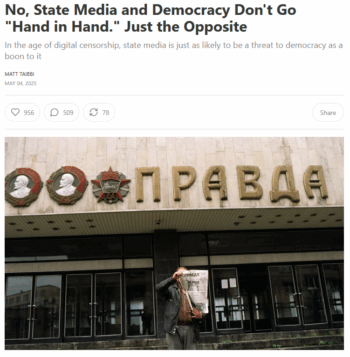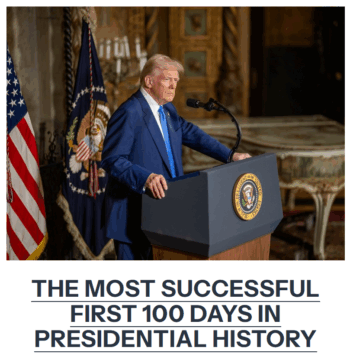'Sad' contrarian Matt Taibbi's attack on public broadcasting slapped down by media critic
The death of former 1960s radical turned right-wing provocateur David Horowitz brought to mind the time he called me “stupid” (Michigan Daily, 9/8/03) because he disliked a column (Michigan Daily, 9/2/03) I wrote about neoconservatism.
I was reminded of that again just days later when Matt Taibbi (Racket News, 5/4/25), a journalist who left Occupy Wall Street populism for ruling class sycophancy, attacked my recent article, “Cuts to PBS, NPR Part of Authoritarian Playbook” (FAIR.org, 4/25/25). In his response, titled, “No, State Media and Democracy Don’t Go ‘Hand in Hand.’ Just the Opposite,” Taibbi asked, “How nuts do you have to be to think ‘strong state media’ doesn’t have a dark side?”
It’s a straw man argument, with a heavy dose of McCarthyism thrown in to boot. I’d encourage everyone to read both pieces in full, but here I’ll break down the main problems with Taibbi’s piece.
Public vs. state media

Matt Taibbi (Racket News, 5/4/25): “The above is either satire or written by someone consciously ignoring the history of state media.”
Taibbi’s main trick is to pretend that “state media” and “public media” are interchangeable. They’re not. State media consists of government propaganda outlets that answer directly to executive authority, rather than independent editors. Public media are independent outlets that receive taxpayer subsidies. As I wrote in my piece, NPR “only gets 1% of its funding directly from the CPB,” the Corporation for Public Broadcasting.
Obviously, if NPR and PBS were “state media,” Trump wouldn’t need to try to shut them down; he would already control them editorially. That’s not to say that they’re perfectly independent. FAIR writers, including myself (11/26/20), have for decades been critical of NPR and PBS political coverage. FAIR (e.g., 6/1/99, 9/17/04, 5/11/24, 10/24/24) has pointed out again and again that right-wing complaints about supposed left-wing bias in public broadcasting have repeatedly resulted in compromised coverage. (I noted in the very piece Taibbi purports to critique that Republican critics of public broadcasting “use their leverage over CPB funding to push NPR and PBS political programming to the right.”)
FAIR’s Julie Hollar (FAIR.org, 5/2/25) wrote just days before Taibbi’s post that NPR had downplayed the Trump administration’s attack on free speech, taking a false “both sides” approach to the issue. So, yes, FAIR is outspoken about the “dark side” of NPR and PBS, and Taibbi surely knows it. But he doesn’t seem interested in an honest argument.
His words, not mine

White House Wire (4/30/25) is already the kind of state media Taibbi warns PBS could turn into.
Taibbi used quotation marks around “strong state media” twice, when those aren’t the words I used—they’re his. He claimed that I was “consciously ignoring the history of state media,” though much of my piece concerned state efforts to force conformity on public outlets. While failing to engage with the rest of my article, he took the reader to Russia in the 1990s, when independent journalists (like himself) were working:
That period, like the lives of many of those folks, didn’t last long. Vladimir Putin sent masked police into the last independent TV station on May 11, 2000, capping less than ten years of quasi-free speech. “Strong state media” remained, but actual journalism vanished.
I’m very open about my opposition to the tyranny of autocrats shutting down and raiding journalistic institutions (FAIR.org, 5/19/21, 6/8/23, 8/14/23, 10/22/24). And my article noted that other wannabe autocrats are attacking public broadcasters, notably in Italy, Israel and Argentina, a fact that does not undermine but rather supports the idea that there’s a correlation between public broadcasting and democracy.
If Taibbi were truly worried about “state media,” he wouldn’t be mad at a meager government subsidy to NPR or PBS, but instead would show more concern for something like the Trump administration’s White House Wire, “a news-style website that publishes exclusively positive coverage of the president on official White House servers” (Guardian, 5/1/25). And mentioning Putin’s attacks on “independent TV” is certainly a better argument against Trump’s FCC investigations into private US outlets like ABC and CBS than it is against the existence of NPR or PBS.
Taibbi’s invocation of “Putin” and “Russia” as a reason why we should not be concerned about Trump’s attacks on public broadcasting is such an illogical non sequitur, it makes more sense to interpret it as standard-issue McCarthyism. This is bolstered by Taibbi’s invocation of more paranoia about any state subsidy for media:
Yes, Car Talk and the MacNeil/Lehrer Report were cool, but outlets like Neues Deutschland, Télé Zaïre and Tung Padewat more often went “hand in hand” with fingernail factories or firing squads than democracy.
He seemed to be trying to scare the reader into thinking that we are just one episode of Wait, Wait…Don’t Tell Me! away from the Cambodian genocide.
The neo–Cold War trick is to just say “Putin” enough times in hopes that the reader will eventually realize that the US government funding anything is a sign of impending tyranny. It’s an old joke to accuse greying reactionaries of hating publicly funded snowplows because “that’s socialism,” but that appears to be where Taibbi is these days.
A sloppy attack

Timothy Neff and Victor Pickard (International Journal of Press/Politics, 7/24): “High levels of secure funding for public media systems and strong structural protections for the political and economic independence of those systems are consistently and positively correlated with healthy democracies.”
Taibbi pretended to refute my claim that “strong public media systems and open democracy go hand in hand,” but in his article’s large block quotation, he omitted two embedded citations to scholarly studies that support this assertion. One of those was from Political Quarterly (3/28/24), the other was an Annenberg School study (3/16/22) whose co-author, Annenberg’s Victor Pickard, has also written about the importance of public media for The Nation (4/15/25).
Taibbi could have challenged those studies if he wanted, and good-faith disagreement is welcome. Omitting them from the quotation, though, leaves out the critical part of my statement.
Taibbi continued:
People who grew up reading the BBC or AFP may imagine a correlation between a state media and democracy, but a more dependable indicator of a free society is whether or not obnoxious private journalism (like the Russian Top Secret, whose editor Artyom Borovik died in a mysterious plane crash) is allowed to proliferate.
I’ve written at length about that dangers that the Trump administration poses when it comes to censorship, intimidating journalists, lawfare against media and using the power of the state to chill speech (FAIR.org, 12/16/24, 1/23/25, 2/18/25, 2/26/25, 3/28/25, 4/29/25). Taibbi ignored this part of my record, which is referenced in part in the very article to which he’s responding. This is crucial, because my defense of PBS and NPR in this instance is part of a general belief that the government should not attack media organizations, public or private.
As someone who read Taibbi enthusiastically when he was a Rolling Stone and New York Press writer, it’s sad to see someone I once admired so sloppily attack FAIR’s defense of press freedom against anti-democratic state power. But on the bright side, his outburst acts as an inspiration for a place like FAIR to continue defending free speech and a free press, while mercilessly calling out state propagandists who disguise themselves as journalists.
- This megachurch pastor actually tried to rebrand 'white privilege' as 'white blessing' gifted from slavery ›
- Noam Chomsky: Social media outlets have 'become major forces for undermining democracy' ›
- Trump's most dangerous Cabinet pick is someone you've probably never heard of ›
- History professor details conservative’s journey from neocon to 'far-right' MAGA 'firebrand' - Alternet.org ›
- FCC chairman assigns 'bias monitor' to CBS — who reports 'directly to the president' - Alternet.org ›
